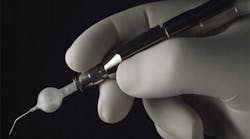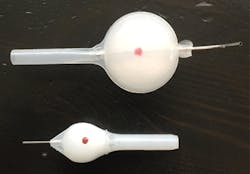Product Review: EtchMaster by Groman Dental
Matthew Wimmer, DMD, FICOI, reviews the EtchMaster air-abrasion unit from Groman Dental. He provides an overview of the adapters and tips available for usage with the EtchMaster, outlines the pros and cons of using the product, and explains how he has incorporated it into his practice.
I have a small four-operatory practice, where space is at a premium. Whenever I can find a product that can help my dentistry and that works well for my limited space, I get very excited. I had been looking to replace my bulky air-abrasion unit, and I stumbled upon a solution at the Spear Annual Faculty Club Summit this past fall.
Enter the Groman Dental EtchMaster. The EtchMaster uses an adapter that fits onto one of your existing dental unit air lines, and it has separate tips to contain the abrasive particles of your choosing.
________________________________________________
ADAPTERS AND TIPS
Groman Dental sells a few different adapters that can be used: a pressure-regulating four-hole adapter (figure 1); a KaVo/Sirona/W&H/Bien-Air/NSK adapter; and a separate quick-disconnect adapter that resembles an air/water syringe.
Figure 1: Four-hole adapter
The adapter of your choosing screws directly into your chairside handpiece adapter, the water-delivery port is sealed off, and air flow is controlled by your foot pedal. With the exception of the quick-disconnect version, the adaptors have a comfortable pencil-style grip.
A multitude of tips are available with three different size options: micro, small, and large. The micro tips cover up to one and a half tooth surfaces; the small tips cover up to six surfaces; and the large tips cover up to 24 surfaces.
Figure 2: Large- and small-sized tips
The tips are prefilled with abrasive powder. Sixteen different formulations of abrasive particles are available in hard, mild, and soft classifications, which are broken down as follows:
Hard abrasive
• 27-mm aluminum oxide: general-purpose bonding
• 50-mm aluminum oxide: orthodontic bonding
• 6 different aluminum-oxide blends: bonding of various ceramics
• 3M ESPE CoJet: (see 3M ESPE CoJet instructions)
• Glass beads: ultra-thin veneers
Mild abrasive
• Aluminum oxide and sodium bicarbonate: preventive sealants and ingrained stain removal
• Aluminum oxide and calcium carbonate: preventive sealants and ingrained stain removal
• Bioactive glass: cleaning, polishing, desensitization
Soft abrasive
• Calcium carbonate: pit-and-fissure sealants, superficial stain removal
• Sodium bicarbonate: pit-and-fissure sealants, superficial stain removal
• Glycine: biofilm removal from implant surfaces
________________________________________________
PROS
• It does not take up space.
• It's easy to use.
• It does not make a mess.
• Patients tolerate it very well.
• A variety of abrasives are available.
________________________________________________
CONS
• The disposable costs for the tips can add up.
• The tip can explode if the air pressure is set too high.
________________________________________________
I use the EtchMaster air-abrasion unit in my practice every day to prepare preps for bonding and crown cementation. My hygienists love it for its ease of use in helping with difficult stain removal. So far, I am pleased with my experience using the EtchMaster; not only does it perform its intended job well and offer a wide array of abrasives for different purposes, but it also saves me valuable countertop and cabinet space in my office!
MORE READING:
Colleen Olson, RDH, demos air polishing with the EtchMaster by Groman Dental (VIDEO)
Pearls for Your Practice: Dryz Gingival Hemostatic Retraction Paste, EtchMaster, Synea 400 and 500
Editor's Note: This article first appeared in Pearls for Your Practice: The Product Navigator.Click here to subscribe. Click here to submit a products article for consideration.
Matthew Wimmer, DMD, FICOI, earned his DMD from Tufts University School of Dental Medicine. He has a passion for continuing education, actively participates in the Spear Education workshops and seminars, and is a member of a Spear Study Club and the Spear Faculty Club. Dr. Wimmer maintains a private practice in the Denver, Colorado, area, where he enjoys racing mountain bikes and taking part in all that the Rocky Mountains have to offer.



